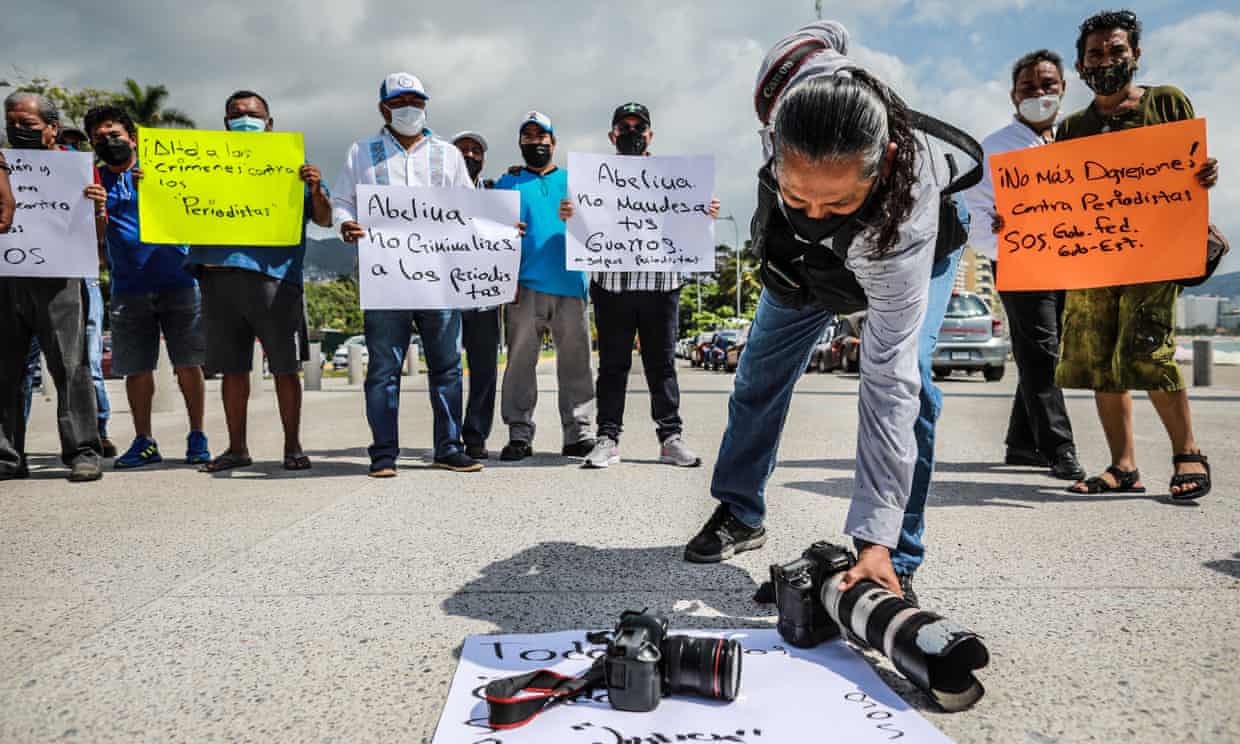
Who will defend those who defend the truth?
The murder of journalists in Mexico, deaths of media workers in Ukraine, and the persecution of the free press in Russia all lead to this question. A question that, perhaps, not enough individuals are posing despite increased risks, and decreased protections, for journalists. In Ukraine the dangers ordinarily faced by journalists have been compounded by the gravity of the ongoing conflict, resulting in journalists becoming casualties of war: the very stories they were designated to tell. Rather than reporting on stories, they have become them. In non-bellic contexts, the murder of journalists and censoring of the press acts as a threat to democracy, undermining political stability for the benefit of inctrasingly autocratic and undemocratic leaders.
In Mexico, at least 5 journalists have been murdered in the first few weeks of 2022.These killings have taken place in a landscape of political violence, with criminal and state actors negotiating for power. The state has benefitted from the narrative that cartels are to blame for violence, absoliving them for their role in undermining the security of journalists. Mexican president Andrés Manuel López Obrador has blamed the legacy of neoliberalism and his political opponents for the murders. Journalists responded by staging protests in over a dozen cities in the country.
The Global Initiative Against Transnational Organized Crime (GI-TOC)’s Global Assassination Monitor found that 22 percent of assassinations of media workers in 2019 and 2020 occurred in Mexico. Despite this, and the wave of recent killings, the only response journalists have received is a ‘promise’ by president López Obrador that there will not be impunity. At the same time, he has continued to attack journalists critical of his administration. How can leaders like López Obrador be trusted to prosecute those responsible for the murders of journalists, when he partakes in similar acts against his critics? The involvement of drug cartels, local politicals, and government officials in the murder of journalists has led to a rate of impunity of over 90 percent for these crimes.
In Ukraine, at least six journalists have been killed while covering Russia’s war on Ukraine. Russia’s missile strikes on civilian areas and attacks as part of the unprovoked invasion have made the labor of journalists increasingly dangerous, with no clear distinction between press and civilian. In response to these killings, Ukraine’s Minister of Defense stated, “the truth is the target.”
Journalists in Russia have similarly been persecuted in their attempts to report on events related to the war and domestic politics. In a bill signed on March 4, non-Russian press was virtually pushed out of the country, leading Western media outlets to suspend or terminate their operations in the country. The new bill introduced a punishment of up to 15 years of prison or a fine as high as 1.5 million rubles (approximately $18,200) for publishing information contrary to the Russian regime’s narrative. The bill targets both journalists and civilians alike.
The situation facing journalists in Russia, Ukraine, and other areas of the world raises another critical question: what is the role of journalists in conflict? Under article 79 of the Geneva Convention, “Journalists engaged in dangerous professional missions in areas of armed conflict shall be considered as civilians” (…) and “be protected as such.” As civilians, journalists are protected under international humanitarian law against direct attacks unless they partake in hostilities. International human rights law makes a distinction between journalists and war correspondents, with the latter being allowed to accompany armed forces and receive prisoner of war status if captured.
However, according to the International Committee of the Red Cross: “Existing laws do provide enough protection. They constitute a solid and realistic basis for shielding media professionals from harm as they work in the battlefield. The most serious deficiency is not a lack of rules, but a failure to implement existing rules and to systematically investigate, prosecute and punish violations.”
In every instance where journalists have been targeted for their work, truth has been a casualty. When journalists have been silenced through censorship, or in its most extreme form, through murder, those interested in maintining a false narrative benefit. Whether they be drug cartels, corrupt politicians, or autocratic leaders, individuals who have an interest in suppressing the truth have, and will continue to target journalists.
The same question still remains: who will protect them? What laws will defend their work? What entities will prosecute those who disappear, torrture, or murder them? Who will keep journalists, and their essential work, safe?
The world needs more than a free press: it needs a living press. For as long as journalists can live to tell stories, those of others, and their own, the truth cannot die.
